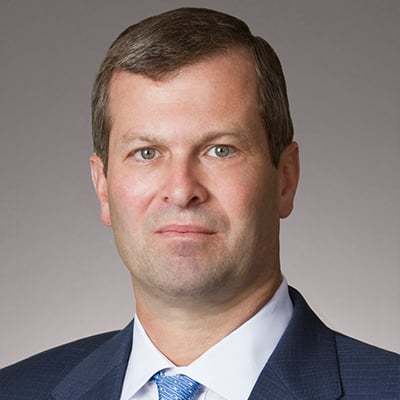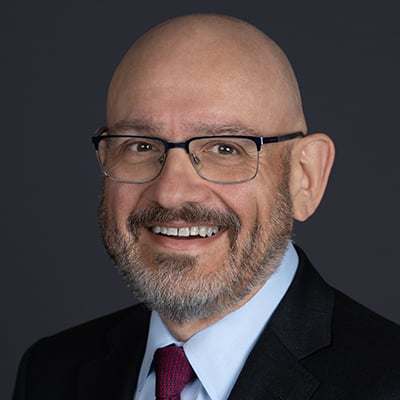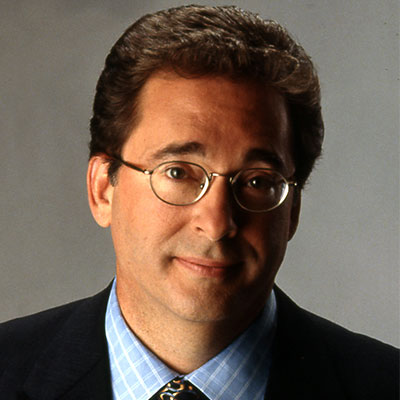Tom Yannucci: On The Attack
By Geanne Perlman Rosenberg
It was one of the greatest First Amendment victories of all time -- Near v. Minnesota, in which the Supreme Court took a strong stand against media censorship. A fifty-three-year-old Chicago lawyer named Weymouth Kirkland, with help from his law partner, Howard Ellis, was the victor. The year: 1931. But these days, when the Kirkland & Ellis letterhead crosses a newsroom desk, the long-deceased partners' names are more likely to engender fear than comfort.
Why? Because Kirkland & Ellis, through the efforts of Thomas D. Yannucci, managing partner of the firm's Washington office, has opposed the news media in controversies that have discredited major news organizations, damaged journalists' careers, and brought millions in settlements to corporate clients.
Yannucci represented General Motors in its 1993 suit against Dateline NBC, showing that the TV newsmagazine had used hidden explosives in a televised crash test demonstration. On behalf of Brown & Williamson his team fought CBS over use of the Jeffrey Wigand interview in the 60 Minutes tobacco story. And, in the Chiquita Brands International, Inc. voice-mail fiasco, Yannucci extracted front-page apologies from The Cincinnati Enquirer, more than $10 million in damages, and the firing of investigative reporter Mike Gallagher. Those few cases indicate how Yannucci and Kirkland & Ellis battle news organizations on behalf of mega-corporations.
Some journalists perceive Yannucci as an enemy of the First Amendment. But that's overly simplistic. Kirkland & Ellis -- Kenneth Starr's home base, and a financial contributor to Hillary Clinton's Senate campaign -- is by no means monolithic, and Yannucci is not single-minded in his view of the press.
"It's not that I don't believe in the free press and civil liberties," says Yannucci, who has worked as a civil rights lawyer at the Justice Department. "I do, very much. I realize that some of my opponents think I'm from the dark side, but that's unfair. I'm not anti-press."
Maybe not, but the list of news organizations he's tangled with is a catalogue of America's top media companies: ABC, NBC, CBS, CNN, The Wall Street Journal, The New York Times, The Washington Post, The Philadelphia Inquirer, USA Today, The New Yorker, Barron's, Bloomberg, Consumer Reports, Sports Illustrated, Reuters, The Associated Press, and others. One editor, who declines to be named, calls Yannucci "a ferocious advocate," and adds: "I wish he represented the media."
Yannucci did not set out to become a news media adversary. He had a broad litigation practice when General Motors, a long-standing Kirkland & Ellis client, contacted his firm with suspicions about the veracity of the Dateline NBC broadcast. Yannucci, who had prior experience with product disparagement cases, mostly in disputes between competitors, took on the high-profile dispute and, thus, in 1993, jump-started his media law practice, which now accounts for about a quarter of his workload.
Yannucci quickly established himself as one of the defamation lawyers news organizations take very seriously, joining the ranks of John J. Walsh, now of Carter, Ledyard & Milburn, and Martin London, of Paul Weiss, Rifkind, Wharton & Garrison. In-house lawyers at top news organizations describe him as "extremely aggressive," "very effective," a straight shooter, and someone who, more than any other plaintiffs' lawyer, "strikes fear in news organizations' hearts." Instilling fear is not necessarily a bad thing from Yannucci's perspective. "I do take it as a compliment," he says.
When representing a client during the reporting phase of an investigative story, Yannucci typically sets ground rules for interviews, such as extracting an agreement that a reporter won't confront the interviewee with any surprise documents. "Clients tend to be suspicious or worried that the press will attack them, and some of that worry is justified." Investigative reporters have no great interest in stories that conclude nobody did anything wrong, he points out.
In the prepublication phase, one of the lawyers in Yannucci's practice -- which now includes two other law partners, James F. Basile and Eugene F. Assaf, and associate Thomas A. Clare, all of whom were hand-picked by Yannucci from his alma mater, the University of Notre Dame Law School -- will typically send letters to editors and lawyers at the investigating news organization. That achieves two goals: it increases the chances that the reporting will be more carefully scrutinized by senior editors and lessens the possibility that the client will be contacted for response at the eleventh hour.
Some defamation lawyers, including Martin London -- whose victories include Jacqueline Onassis's privacy dispute and a Brown & Williamson case against CBS affiliate WBBM-TV in Chicago -- write letters with the aim of scaring off news organizations. When asked about preemptive strikes against the news media, London replies, "I do that all the time. I have always done that. I think it's intimidating." He compared a defamation lawyer's threats of libel suits to a police officer's "chilling effect on a mugger." Yannucci, now fifty, says that intimidation is not his style. He prefers "to persuade, not intimidate."
Kirkland & Ellis sometimes positions itself between a news organization and the subject of an investigation. For example: when representing the manufacturer Brush Wellman, Inc. -- in a conflict with the Toledo Blade over the paper's award-winning report on the dangers of beryllium -- the firm insisted that future queries from the paper be addressed to the law firm instead of the company.
When an investigation is "turning south," the firm writes "warning letters" to editors and their lawyers, putting the news organization "even more on notice that they've got to include our side of the story."
Some publications and broadcast news outlets, which he declines to identify, are more likely than others to "shy away from a fight," Yannucci says, probably out of concern for the expense of litigation and the prospect of having reporters' notes and the editing process subject to examination. Others, such as The New York Times and The Wall Street Journal, he says, don't get "scared away from a story." But even news organizations with a lot of backbone can bend under the right arguments. As a consequence of prepublication efforts, he says, he's usually able to influence a story (for example, getting the client's name dropped), or even stopping one, "not because of threats, but because the editors become convinced their story didn't pan out."
Post-publication is another game altogether, in which the defamation lawyer goes on the offensive. In this posture, Yannucci demands corrections, apologies, retractions and/or the publication of letters to the editor in the effort to repair the client's public image.
Kirkland & Ellis won a letter of apology from Houghton Mifflin to former White House aide Mark Paoletta over a reference to him in a book about Supreme Court Justice Clarence Thomas.
In NBC's retraction for its "Waiting to Explode" segment, Jane Pauley and Stone Phillips admitted to a national audience that NBC's contractor put incendiary devices under GM trucks to ensure there would be a fire, that placing the devices "was a bad idea from start to finish" and that they deeply regretted the "inappropriate demonstration." Yannucci won a large settlement, but he often advises clients not to litigate. "Credibility is extremely important to my practice," he says.
Another of Yannucci's post-publication tactics is to write to awards committees requesting that stories about his clients be dropped from consideration. Kirkland & Ellis contacted prize boards, including the Pulitzer board, that were considering the Toledo Blade's beryllium series. The law firm failed in that effort. Past presidents of the Cleveland and Cincinnati chapters of the Society of Professional Journalists wrote to the Blade's executive editor, Ron Royhab, stating: "You should know that our chapters were approached by the Kirkland & Ellis law firm, asking us to dump the [beryllium] series from the competition. We most certainly refused. We are pleased to inform you the series has won first place for the Best Investigative Reporting Award."
The series also was a Pulitzer finalist, won the Investigative Reporters and Editors top award for outstanding investigative work, and earned a cjr Laurel.
Fritz Byers, general counsel of Block Communications, which owns the Toledo Blade, says that in twelve years of representing the Blade, he's "never seen anything like this -- this kind of intensive attack on a publication.
"Newspapers and general counsel for newspapers are very familiar with receiving complaints about articles -- claims that a story was false, or omitted facts, or was somehow misleading. That's not new. What is striking about this episode is that the challenge to the publication went so far beyond suggesting there were factual errors. It involved also attacks on the publication to third parties. I had never witnessed anything like that before."
Yannucci defends the practice of contacting prize boards in certain cases. "If you think a story is unfair, it's only adding insult to injury to have it given an award," he says. "It's part of what a journalist should expect if they do a story. It ought to withstand scrutiny. I would think the committee would want to hear both sides of the story before they issue an award."
As for his firm's attack on the Blade, Yannucci, an Ohio native, responded, with a trace of a midwestern accent, "Chiquita and Dateline NBC were pretty concentrated attacks. It can rain a lot harder. It can get worse."
Yannucci and his firm have been involved in a challenge to Seymour Hersh's New Yorker article about the former general and current drug czar Barry McCaffrey's role in the gulf war.
In most media cases, says Yannucci, "money is not the objective. Clients are almost always focused intently on 'This is terrible. This is unfair. Can you help me get this clarified.'"
Indeed, history shows that defamation plaintiffs rarely recover monetary windfalls. Defamation cases can drag on for years and, even if the plaintiff succeeds at the trial level, awards often get sliced to next to nothing on appeal.
John J. Walsh has had many long media litigations and some major court victories, but hardly any significant monetary awards that have withstood the test of appellate review. In his first major libel case, he represented William P. Tavoulareas, former president of Mobil Oil, against The Washington Post, over some 1979 news articles that alleged he misused his position. Walsh won a $2,205,000 judgment, which was upheld on its initial appeal, and later reversed. The case wasn't finally laid to rest until 1987, when the Supreme Court declined to review it.
Unlike the well-organized and collegial media defense bar in which members from different firms support each others' attempts to protect the First Amendment and the rights of the press, media plaintiffs' lawyers tend more to be lone wolves than part of a pack.
"We're kind of a disparate group," says Walsh. Lawyers who sue the news media aren't united in "a common cause."
While Yannucci does some media defense work, it can be difficult for a media plaintiffs' lawyer to also defend media companies. Martin London, who once upon a time did libel defense work for the New York Post, says representing plaintiffs "was not a question of conscience on my part. I didn't switch sides. The sides switched me." Ever since his representation of Brown & Williamson, London says, he's never had another media client. "They would never hire me. They're very clubby about that."
Reprinted by permission of author and Columbia Journalism Review.



